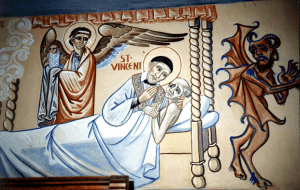 You will attain this happiness if you practice faithfully humility, gentleness, and charity toward the poor…1
You will attain this happiness if you practice faithfully humility, gentleness, and charity toward the poor…1
Vincent de Paul remembered the moment captured in the featured illustration as pivotal for him in transforming his sense of mission and vocation. The sacred dignity of this poor, dying peasant became evident to him. With Madame de Gondi’s help, Vincent came to realize there were many people like this who lacked vital spiritual and physical care, and that existing systems within both the Church and society routinely neglected their needs.
Over time, Vincent de Paul grew to be consistent in living the mission he professed. He encouraged his companions to look at reality through the perspective of those enduring poverty, those who suffered basic needs, or those who were routinely left out by the status quo of church, state, and society at the time. He would ask his community, in essence: What do these people need and how do our actions and decisions impact them? How can our resources be used to better serve them? Vincent further recognized the importance of forming leaders who shared his vision and were committed to this sense of mission. He envisioned a community of solidarity that surrounded and supported people in need, and in so doing, enabled all to flourish.
Compassion and care for those struggling with the effects of material and systemic poverty is essential to a Vincentian perspective. Their realities make a claim on us, inviting us to take action. They call us to make changes individually and collectively to address their immediate needs, as well as to confront the root causes of their suffering. This is what we are challenged to do when asking ourselves what has come to be known as the Vincentian question: “What must be done?”
The COVID-19 crisis and its aftermath have required us to make difficult decisions about what we value, as well as the vision we will pursue, both individually and collectively. Vincent’s example invites us to center the perspective of those in poverty, or of those suffering or in pain, and to care for them. Currently, this includes those facing the horrible effects of COVID-19, those who have died, those who have lost loved ones, or those struggling because of unemployment. Vincent’s vision ensures that all people experience a sense of human community and that they are given both the opportunities and resources necessary to flourish. For Vincent, safeguarding hope for those left behind or forgotten by society, especially those in dire conditions, was a necessary part of working for the good of all humanity.
How might “seeing with Vincentian eyes” shape our vision for how to respond to the current crisis? For the education we offer? For the way we go about business as a university? What does it invite you to consider in your work as a colleague, or in your role as a neighbor, citizen, or family member?
1 2787, To Sister Françoise Ménage, In Nantes, 12 February 1659, CCD, 7:471.
Reflection by:
Mark Laboe
Associate Vice President
Faculty and Staff Engagement
Division of Mission and Ministry